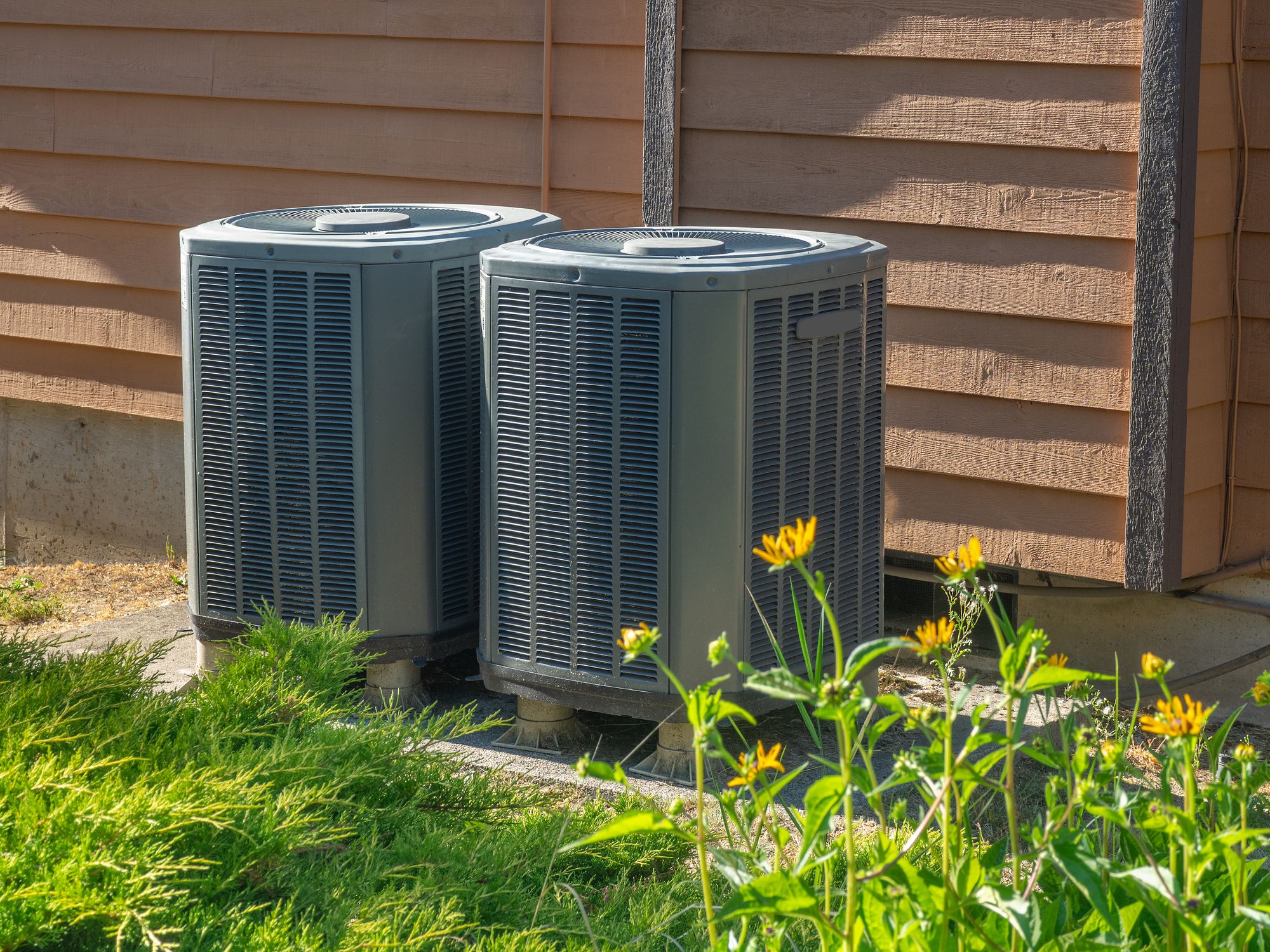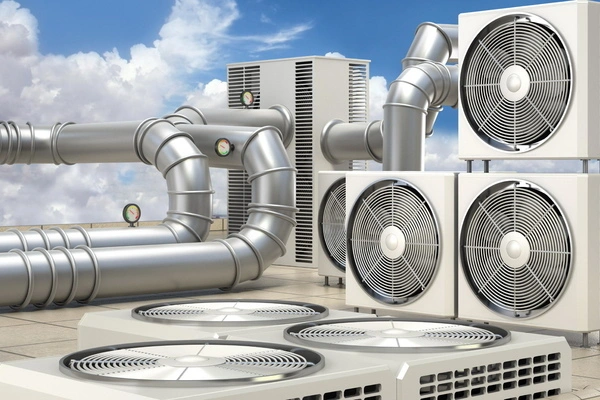Discovering the Necessary Parts of an Efficient Cooling And Heating System
An effective HVAC system is constructed on several important components that operate in harmony. Each part, from the thermostat to the ductwork, plays an essential function in maintaining comfort and power performance. Understanding these elements is important for optimizing performance and enhancing indoor air top quality. As one checks out these parts, the intricate connections between them expose insights into enhancing general system efficiency. What certain aspects add most to this effectiveness?
The Function of the Thermostat in Cooling And Heating Performance

Although commonly ignored, the thermostat plays an essential duty in the performance of HVAC systems. HVAC experts. This small gadget works as the key nerve center, controling temperature settings and guaranteeing optimal convenience within an area. By properly picking up the ambient temperature level, the thermostat connects with the air, air flow, and heating conditioning units to maintain the preferred environment
An efficient thermostat lessens energy usage by activating the cooling and heating system only when needed, thereby stopping excessive heating or air conditioning. Modern wise and programmable thermostats boost this effectiveness better by allowing users to establish timetables and remotely change setups, adjusting to daily routines.
The positioning of the thermostat is important; inappropriate place can lead to imprecise temperature readings, resulting in ineffective procedure. On the whole, a well-functioning thermostat not just boosts comfort however also adds markedly to energy savings and the long life of the HVAC system.
Recognizing the Value of Air Filters
Air filters offer a crucial feature in HVAC systems by guaranteeing that the air circulating within a space remains clean and healthy and balanced. These filters catch dirt, allergens, and other pollutants, preventing them from being recirculated throughout the environment. By recording these fragments, air filters add to boosted interior air top quality, which can substantially profit owners' wellness, specifically those with allergic reactions or breathing conditions.
Additionally, maintaining tidy air filters boosts the performance of HVAC systems. Stopped up filters can limit air movement, creating the system to function more difficult to maintain wanted temperatures, causing boosted power intake and greater energy expenses. Routinely replacing or cleaning filters is an important maintenance action that can lengthen the lifespan of cooling and heating tools. Ultimately, comprehending the value of air filters permits property owners and building supervisors to take positive measures to ensure a well-functioning, efficient cooling and heating system that promotes a secure and comfortable interior environment.

The Performance of the Furnace and Warmth Pump
Heating systems and heat pumps are crucial parts of a/c systems, accountable for giving heat during cooler months. Heating systems run by heating air through burning or electric resistance, after that distributing it throughout the home using air ducts. They generally provide quick home heating and can be fueled by natural gas, electrical energy, or oil, relying on the system type.
Alternatively, warm pumps move warm as opposed to produce it. They remove warm from the outside air or ground, also in low temperatures, and transfer it inside your home. HVAC experts. This double performance permits warm pumps to additionally give air conditioning in warmer months, making them flexible options for year-round climate control
Both systems need correct maintenance to ensure efficiency and long life. While heating systems master severe cold, heatpump can be useful in moderate climates. Comprehending their distinctive functionalities help property owners in picking one of the most ideal option for their home heating requires.
Discovering the Air Conditioning Unit
The air conditioning unit is an essential part of heating and cooling systems, offered in different kinds to fit various requirements. Recognizing the performance rankings of these devices is essential for making notified options regarding energy usage and price. This area will certainly discover the varied kinds of a/c and make clear just how performance rankings image source influence efficiency.
Kinds of Air Conditioners
While numerous elements influence the option of a/c systems, recognizing the different kinds available is important for home owners and building supervisors alike. Central air conditioners are developed to cool whole homes or structures, making use of a network of air ducts for air flow. Window units offer an even more local service, ideal for solitary areas or small rooms. Portable a/c supply versatility, allowing customers to move the unit as required. Ductless mini-split systems are one more alternative, integrating the efficiency of main systems with the benefit of zoning, as they require no ductwork. Ultimately, geothermal systems harness the earth's temperature level for energy-efficient air conditioning. Each kind includes distinct benefits, making notified choices essential for reliable environment control.

Performance Rankings Discussed
Comprehending effectiveness scores is important for selecting the appropriate a/c unit, as these metrics provide insight right into the system's performance and power usage. One of the most typical score for a/c is the Seasonal Energy Efficiency Proportion (SEER), which determines the cooling result throughout a typical air conditioning period divided by the complete electric energy input. A greater SEER suggests far better efficiency. In addition, the Energy Effectiveness Ratio (EER) is made use of for measuring efficiency under certain conditions. An additional essential metric is the Power Star accreditation, which signifies that a device meets stringent power efficiency guidelines. By examining these ratings, customers can make informed choices that not only maximize convenience but likewise lower energy prices and environmental impact.
The Value of Ductwork and Airflow
Effective ductwork style and air movement management play critical roles in the overall effectiveness and efficiency of a/c systems. Correct ductwork warranties that conditioned air is distributed evenly throughout a space, decreasing temperature level changes and improving convenience. Properly designed air ducts lessen resistance to air movement, lowering the work on HVAC tools and ultimately lowering energy intake.
Air movement monitoring involves tactically putting vents and registers to improve the flow of air. This avoids common issues such as cool or warm places, which can happen when air flow is obstructed or inadequately balanced. In addition, the appropriate air duct materials and insulation can even more improve efficiency by reducing warmth loss or gain throughout air transit.
An efficient ductwork system not just adds to energy savings but can additionally extend the lifespan of HVAC tools by minimizing unnecessary strain (HVAC experts). Subsequently, recognizing the relevance of ductwork and airflow is necessary for attaining peak a/c system performance
Regular Upkeep Practices to Enhance Efficiency
Regular upkeep methods are important for ensuring peak efficiency of heating and cooling systems. These practices consist of routine inspections, cleansing, and required repair work to maintain the system running efficiently. Regularly altering air filters is crucial, as clogged filters can obstruct air movement and decrease performance. Furthermore, professionals ought to examine and tidy evaporator and condenser coils to avoid getting too hot and energy waste.
Annual expert assessments are also suggested, as experienced technicians can determine possible issues before they intensify. Oiling moving parts lessens damage, contributing to a longer life expectancy for the system. In addition, guaranteeing that the thermostat works appropriately help in maintaining optimal temperature level control.

Regularly Asked Questions
How Typically Should I Replace My Thermostat?
Thermostats need to normally be changed every 5 to ten years, relying on use and innovation improvements. Regular checks are advisable to ensure peak performance, particularly if experiencing inconsistent temperature level control or boosted energy prices.
What Size Air Filter Is Ideal for My Cooling And Heating System?
The very best size air filter for a HVAC system varies by device layout. Commonly, it's vital see here now to consult the owner's handbook or inspect the existing filter dimensions to guarantee peak performance and air quality.
Can I Install a Heat Pump Myself?
Mounting a warmth pump individually is feasible for skilled individuals, but it calls for expertise of electric systems and neighborhood codes. Hiring a professional is recommended to assure proper installment and ideal system performance.
How Do I Know if My Ductwork Is Efficient?
To determine ductwork performance, one need to look for leakages, procedure airflow at vents, evaluate insulation high quality, and assess temperature differences between supply and return air ducts. Expert assessments can supply extensive understandings right into overall efficiency.
What Are Signs My Heating And Cooling Needs Immediate Maintenance?
Signs that a cooling and heating system needs prompt upkeep include unusual sounds, inconsistent temperatures, boosted energy expenses, undesirable get more odors, and constant cycling. Resolving these issues without delay can protect against additional damages and assurance optimal system performance.
Air filters serve an important feature in A/c systems by guaranteeing that the air circulating within a space stays healthy and balanced and tidy. In addition, maintaining tidy air filters improves the performance of A/c systems. Ductless mini-split systems are another alternative, integrating the performance of central systems with the ease of zoning, as they need no ductwork. Recognizing efficiency scores is necessary for selecting the best air conditioning device, as these metrics provide understanding into the system's efficiency and power consumption. The finest size air filter for an A/c system differs by unit design.